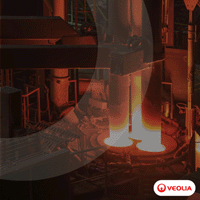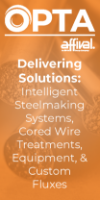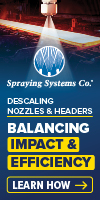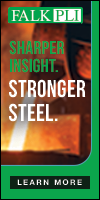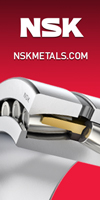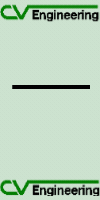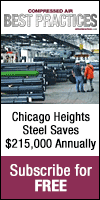SSAB Introduces a Green Steel, and New Growth Targets
03/28/2023 - SSAB has unveiled a branded steel made from scrap and produced with fossil-fuel-free energy.
Called SSAB Zero, the steel’s production doesn’t rely on carbon emission offsetting and mass balancing allocation of emission reductions to achieve low emissions, SSAB said. Instead, fossil fuels remain in the ground as the company uses a system to ensure alternative energy sources are used in producing the steel.
Still, fossil-free doesn’t mean CO2-free – the company said the steel has a scope 1 and 2 CO2 emissions penalty of 0.05 kg per each kg of steel. Nevertheless, SSAB said the new brand gives its a second green product offering.
“We are proud to already today be able to strengthen our portfolio with SSAB Zero, as we see increasing customer demand for steels with low emissions,” said SSAB president and chief executive Martin Lindqvist. “By further enhancing steelmaking processes, we will provide a comprehensive offering with zero emissions while reducing the impact on the planet.”
SSAB said the steel will be available in the second quarter. The goal is to deliver 40,000 metric tons to the market this year, increasing to 100,000 metric tons in 2025. SSAB customer Volvo has already agreed to take delivery of some of it, SSAB said.
The company said its green steel offerings are a potential driver of growth as it believes there will be a premium on green steel, given the price of carbon dioxide emissions in Europe, higher production costs and the value added for buyers. It said it believes that premium to be around EUR300/metric ton.
SSAB introduced SSAB Zero during a capital markets day in Stockholm. Also during the event, the company laid on the table new profitability estimates arising from its SEK50 billion plan to convert to fossil-free production in Europe.
The company said it sees the potential to generate at least SEK10 billion in annual earnings once the conversion is completed. Some of that is based on increased processing capacity for high-strength steel. Its special steel unit shipped 1.4 million metric tons in 2022, but the company aims to increase that to 2.2 million tons by 2030.
Also, SSAB Europe hopes to increase premium steel shipments to 1.2 million tons and automotive-oriented advanced high-strength steel (AHSS) shipments to 1.4 million tons. In 2022, SSAB Europe’s shipments of premium products amounted to 800,000 metric tons and shipments of automotive AHSS stood at 500,000 metric tons.
“We have an exciting time ahead of us and SSAB has a unique possibility to strengthen our competitiveness, which in turn creates value for all the company’s stakeholders,” said Lindqvist.
Still, fossil-free doesn’t mean CO2-free – the company said the steel has a scope 1 and 2 CO2 emissions penalty of 0.05 kg per each kg of steel. Nevertheless, SSAB said the new brand gives its a second green product offering.
“We are proud to already today be able to strengthen our portfolio with SSAB Zero, as we see increasing customer demand for steels with low emissions,” said SSAB president and chief executive Martin Lindqvist. “By further enhancing steelmaking processes, we will provide a comprehensive offering with zero emissions while reducing the impact on the planet.”
SSAB said the steel will be available in the second quarter. The goal is to deliver 40,000 metric tons to the market this year, increasing to 100,000 metric tons in 2025. SSAB customer Volvo has already agreed to take delivery of some of it, SSAB said.
The company said its green steel offerings are a potential driver of growth as it believes there will be a premium on green steel, given the price of carbon dioxide emissions in Europe, higher production costs and the value added for buyers. It said it believes that premium to be around EUR300/metric ton.
SSAB introduced SSAB Zero during a capital markets day in Stockholm. Also during the event, the company laid on the table new profitability estimates arising from its SEK50 billion plan to convert to fossil-free production in Europe.
The company said it sees the potential to generate at least SEK10 billion in annual earnings once the conversion is completed. Some of that is based on increased processing capacity for high-strength steel. Its special steel unit shipped 1.4 million metric tons in 2022, but the company aims to increase that to 2.2 million tons by 2030.
Also, SSAB Europe hopes to increase premium steel shipments to 1.2 million tons and automotive-oriented advanced high-strength steel (AHSS) shipments to 1.4 million tons. In 2022, SSAB Europe’s shipments of premium products amounted to 800,000 metric tons and shipments of automotive AHSS stood at 500,000 metric tons.
“We have an exciting time ahead of us and SSAB has a unique possibility to strengthen our competitiveness, which in turn creates value for all the company’s stakeholders,” said Lindqvist.


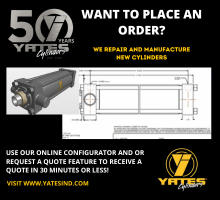
.png?lang=en-US&ext=.png)
